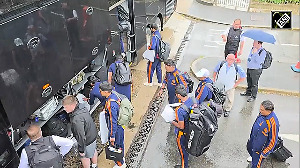.jpg?w=670&h=900) Ruling out any third party intervention on the Kashmir issue, Union Minister Shashi Tharoor said had Pakistan acted in the spirit of the Simla accord the question of external mediation would not have come up.
Ruling out any third party intervention on the Kashmir issue, Union Minister Shashi Tharoor said had Pakistan acted in the spirit of the Simla accord the question of external mediation would not have come up.
"We do not need intervention from anybody. We need the people on the other side to behave according to their solemn international obligations," the Union Minister of State for Human Resource Development told reporters after a lecture "Peacemaker in need of Pacemaker?" organised to mark the 68th UN day.
India on Sunday rejected Pakistan Prime Minister Nawaz Sharif's plea for US intervention on Kashmir. He stressed that if both the countries worked upon agreements signed between them then there was no need for a third party intervention.
"Having worked together on the the Simla Accord, if they acted in the spirit of the accord, subsequent agreements like the Lahore agreement and (looking at) so many occasions various commitments that have been....we would not need any third party to come in," said the former Under-Secretary General at the United Nations who was with the organisation for nearly three decades.
He also stressed that the soil of Pakistan should not be used for terrorist activities against India.
With India looking to solve Kashmir issue bilaterally, the United Nations Military Observer Group in India and Pakistan has become irrelevant now, Tharoor said.
"We have not been giving complaints to the UN observer group since the Simla agreement as we feel the issue should be resolved bilaterally and the reason our government has been talking to Pakistan is to make it something that can be solved bilaterally."
UNMOG for India and Pakistan, which was formed in 1948 was the second oldest mission formed by the UN. Terming it as an "open ended mission without an expiry date", he said it can only be closed if India and Pakistan mutually agree to it.
"At that time it (the UN) did not have established procedures. Today, we see missions with a mandate of six months or a year and it has to be renewed. This mission has not been renewed since 1972 Simla agreement. Unfortunately this mission was set up under different provisions in 1948," he said.
Despite the UN role's in failing to curb the crisis like the one in Syria and in Rawanda, he made a strong case stating that the UN is still relevant to the world as it was in 1945 because of its humanitarian work.
"There is a case for reviving the entire architecture of the international system that was built in 1945," he said.
He, however, strongly advocated for reforms within the international body and stressed on reforming the UN Security Council.
Referring to the expansion of the Security Council, he said, "Its a place where one or the two members disagree with the rest....where all bunch of doctors gather to treat a patient and they all agree on the diagnosis, but can not agree on the prescription," he said.
He added that aspects like International policing and intelligence gathering at the UN level were not taking place. Actions on these aspects were desired, but required to be aided by political consensus.











